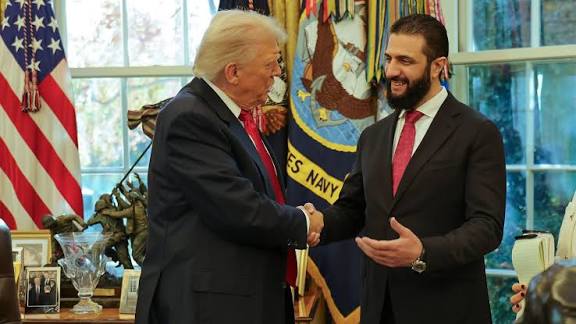Syria will now join the international coalition to combat the Islamic State (IS) group, signaling a major shift in US foreign policy in the Middle East, according to a senior Trump administration official.
The announcement came as President Donald Trump hosted Syrian President Ahmed al-Sharaa at the White House—the first visit by a Syrian leader to Washington in history. During an interview on Fox News, al-Sharaa described the meeting as the start of a “new era” of cooperation with the United States.

Trump expressed support for al-Sharaa, who until recently was designated a terrorist by the US government. Syria becomes the 90th country to join the coalition, which aims to eliminate remaining IS elements and curb the flow of foreign fighters to the Middle East.

Following the meeting, the US administration confirmed that the Treasury, State, and Commerce Departments would announce measures to lift economic restrictions on Syria and provide clarity for investors. Among these measures is a 180-day suspension of the Caesar Act, which has sanctioned Syria since 2019.

Speaking in the Oval Office, Trump said: “We want to see Syria become a country that’s very successful. And I think this leader can do it. I really do.”
Diplomatic relations between the US and Syria, suspended since 2012, will now be partially restored, with Syria allowed to reopen its embassy in Washington. This marks the third meeting between Trump and al-Sharaa, following a Gulf Cooperation Council summit in May and a UN General Assembly dinner in September.

Al-Sharaa, formerly a leader of Al-Qaeda’s Syrian branch and later the head of Hayat Tahrir al-Sham, was recently removed from the US “specially designated global terrorist list.” Since becoming interim president, he has sought to rehabilitate his image while attempting to rebuild Syria after 13 years of conflict.

Trump acknowledged al-Sharaa’s controversial past but praised his potential, saying: “He has had a rough past. And I think, frankly, if you didn’t have a rough past, you wouldn’t have a chance.”
Al-Sharaa emphasized that discussions with Trump focused on Syria’s future as a geopolitical and economic partner of the US. However, his administration continues to face challenges, including violence against minorities and clashes between different militias. He has pledged to address human rights violations within his security forces.
The US had previously lifted sanctions on Syria in June, aiming to support the country’s stability and monitor steps toward normalizing regional ties and combating militant groups.




